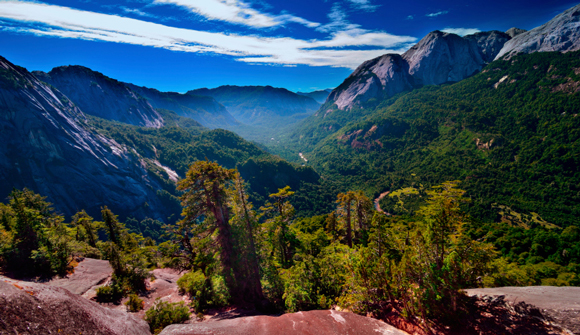

Yes, I know most free-market thinkers have read Atlas Shrugged and we certainly identify philosophically today with the appeal of a Galt's Gulch-style community like Rand described in her novel. But let's talk about how we can learn from the problems of Galt's Gulch Chile and what to do differently next time.
First, I'm a libertarian, actually met Ayn Rand once and even visited Ouray, Colorado where she wrote much of the book and which served as her geographic model for the Galt's Gulch in her novel. I consider Wendy McElroy, who has written so eloquently about the tragedy to date of the Galt's Gulch Chile project, as a personal friend but I never bought into the project for reasons I will discuss below.
Most of you know me from my work creating gold and Swiss franc related products in the financial industry or my free-market writing but I also have a real estate background. After selling my Swiss investment firm and retiring the first time back in 2000, I sold resort real estate and was marketing vice president for a 5,000-acre mountain resort.
I will address my thoughts here without reference to specific individuals or who said and did what and when but rather focus on how potential buyers should look at any real estate purchase in a second home community.
If Not In Writing, It's Just A Conversation
Handshake deals are fine in many circumstances and some work out for a while – until they don't – but never make a decision in a real estate transaction based on verbal commitments or promises. You must always rely on the printed sales documents and, more importantly, the signed sales contract; otherwise, all the time you spent on the phone or preferably in person was nothing more than a conversation and not a binding agreement.
Show Me the Evidence
Take personal responsibility in your due diligence effort on any project you might buy into personally or refer to others. Ask specific questions of the salesperson, real estate professional, or development promoter. Never trust and always verify the answers to your questions and require them to be in writing or else, as I said, you're just having a private conversation while riding around looking at property.
Of course, the property always looks great or else it wouldn't be a real estate development and yes, the salesperson has all the answers or else he/she wouldn't be in real estate sales. But do not let the beauty of the area or the smooth talker take advantage of you. In the final analysis, their job is to push real estate and it is your responsibility to protect yourself with adequate due diligence and sound judgment not theirs, regardless of what is stated or implied.
Woody Allen once joked, "A stock broker is one who invests other people's money until it's all gone." It is the same in real estate sales.
Take Personal Responsibility for Your Actions
One post about Galt's Gulch Chile referred to a buyer who had supposedly used all of his available funds to purchase a lot and now had to live in his car because he was broke. Well, I'm sorry, but what happened to individual due diligence, personal responsibility for one's own actions or maybe a little common sense? How prudent is it for anyone to use all of their available funds to purchase an undeveloped lot anywhere, much less in a distant foreign country on another continent?
Remember, neither the government nor the legal profession are going to protect your interests like you should do yourself. Yes, there are real estate forms ad nauseam with signatures promising this or that, especially in the United States. Some of these regulations and required forms might happen to protect your property or you on occasion but you must take personal responsibility when making real estate decisions.
Good government doesn't exist anywhere in the world and it is never your friend and usually your enemy. In addition, history shows us that a limited government that has some attributes we might like usually gets more centralized and harmful over time.
Litigation after a real estate deal has gone bad might generate legal fees for the lawyers but seldom any substantial restitution of your money takes place; otherwise, the real estate operation wouldn't have gone under in the first place.
There is a risk in relying on others just as there is a risk in putting much faith in government or legal institutions to protect you. I think those who are choosing to avoid the legal system on ethical grounds are to be congratulated.
Do Your Own Due Diligence
Before signing a contract and making a deposit on real estate always get answers and proper verification to at least the following questions in writing, in print. Obviously, there are many more details you need, in writing, depending upon the location and situation but here are a few to get you thinking.
Find out who is representing you in the real estate transaction, if anyone, as the agent is usually representing the seller. The priority of the developer or promoter is always them first and you second. If the jurisdiction allows for buyers' agents consider going this route. Of course, when going into the potential transaction have an attorney involved who has expertise in the type of real estate and the location you're considering.
How do you get your water? Do you have to dig a well or build a cistern or does a government or community entity provide this? If so, how is that accomplished? What permits and fees are required? And, very importantly, who owns the water rights?
Find out about the septic or sewer situation. What regulations are in place? Who provides the installation?
Is money in escrow for the proposed or promised amenities? All developments and communities promise a wide range of amenities; most are seldom finished completely. Do community covenants or regulations exist in addition to those set forth by the local government?
Zoning is very important. What exactly can you build on your lot? Is there room for a well and septic tank and drain field etc.? Are you able to subdivide your property later if you so choose? I can't begin to tell you how many lots in mountain areas are unbuildable for one regulatory reason or another.
Remember, most developers are interested in selling dirt not in building you a home on the property and most lots are never built on. So another important due diligence question for you to determine before making that deposit is how the heck do you get a house built in the community? Again, the promoters will, of course, tell you about "the lower building costs" as well as other advantages to the location but it is not easy to build a house where you currently reside much less long distance, internationally, given potential language barriers, a different legal system and possibly very different local business customs.
Most second-home developments are never sold out and the US is full of partially built or vacant real estate communities that never built the proposed or promised amenities. This is just the history of real estate development. This is even more important outside the United States so do your due diligence.
Philosophically Based Communities Have Advantages and Disadvantages
We all know the advantages of spending time with likeminded people with whom we have things in common but this refers to a voluntary association. Your neighbors are permanent unless one of you move. Also, you aren't all going to be one big happy family because you'll probably have more arguments over ideas you're interested in together than if you didn't share these interests.
While I guess it would be nice having neighbors that share some of your personal economic or political views, creating a town or development just for a specific religion, political or economic view is just a bad idea. How would you like to live in a development of all one profession, race, religion or limited to libertarians, conservatives or socialists?
Yes, voluntary associations are good, but there is nothing voluntary about a next-door neighbor or neighborhood association. It is just too close for comfort. Now, I have to say that Doug Casey and his La Estancia de Cafayate down in Argentina, described as a secluded wine and residential sporting estate or an international community of likeminded friends, is the right way to go. They have expats and international buyers from the US and a wide range of countries including Argentina all interested in the amenities of the location and entrepreneurial spirit of the founders.
A low-key philosophical association and branding of the community is a good idea. It should be open and promoted to people with different interests to have the best chance for success.
History is full of failed one-issue communities that were the lofty idea of a great visionary with leadership and promotional skills and most failed, at least in the vision of the founder. I think of William Penn, a real estate entrepreneur, philosopher and Quaker who founded Philadelphia. Or the Mormon prophet, Joseph Smith and the founding of Nauvoo, which in the 1840s rivaled Chicago for a while as the largest city in Illinois.
I really wish the investors and everyone involved with Galt's Gulch Chile all the best and hope they find a resolution to the problems of a wonderful idea and place down in Chile.
Conclusion
We all want the freedom, economic opportunity and free-market solutions that are in short supply in the US and other Western nations today, mired in permanent war, central bank controls and failed political systems. Everyone is looking for the safe haven right for them and their family during this very scary time.
And so it has been throughout history. People have attempted to escape evil despots, collapsed economies, wars and political tyranny by fleeing to new lands where liberty, the rule of law and prosperity is respected and can again be restored. Whether you're into building your own Galt's Gulch, a new Atlantis, Zion or another gathering place of likeminded people, don't give up on your dreams for a better, more free and prosperous future. Yes, most of these projects fail but some do succeed, at least for a while.
After all, it happened in the country of my birth, the United States, for a number of decades. As they say in New Hampshire, "Live Free or Die." I think this thought should close the discussion today.
